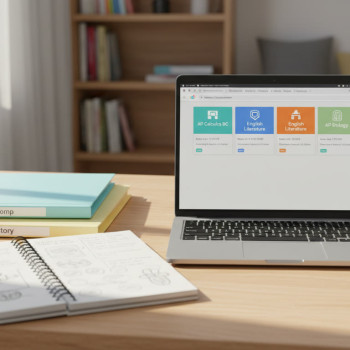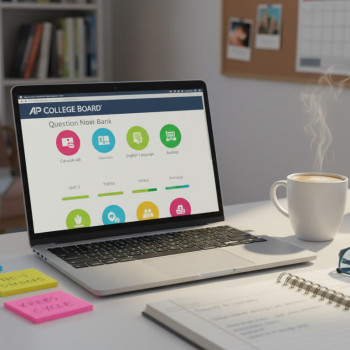Why This Timeline Matters — More Than Dates
If you’re thinking about AP Capstone — or you’re already signed up for AP Seminar with an eye on AP Research next year — congratulations. You’re choosing one of the most practical and college-relevant experiences the AP program offers. But the path from Seminar to Research can feel like a long, complicated staircase. This blog is your step-by-step, human-friendly roadmap: what to do, when to do it, how to think about each milestone, and how to stay sane, strategic, and proud of your progress.

Big Picture: What Are AP Seminar and AP Research?
Put simply: AP Seminar teaches you how to ask good questions, analyze complex issues from multiple perspectives, gather evidence, and present arguments clearly. AP Research is where you take those skills and run — designing and carrying out a yearlong independent investigation culminating in a 4,000–5,000 word academic paper and an oral defense. Most students take Seminar first (often in 10th or 11th grade) and Research the following year.
Why colleges care
These courses don’t just test content knowledge. They show admissions officers that you can do independent, sustained academic work — something that matters once you’re in college and even beyond.
AP Capstone Timeline Overview
Think of the timeline as three overlapping tracks: academics (what you learn in class), assessments (performance tasks, portfolios, and exams), and project milestones (for Research especially). Below is a typical yearly rhythm for students who start with AP Seminar and move into AP Research the following year.
| Timeframe | Seminar (Year 1) | Research (Year 2) |
|---|---|---|
| Before Year 1 | Course selection, orientation, topic exploration | AP Seminar completion required before enrolling |
| First Semester | Skill-building: inquiry, source analysis, team project prep | Developing a research question, literature review begins |
| Second Semester | Individual paper, end-of-course exam, digital portfolio submission | Data collection / project development, process portfolio entries |
| Final Months | Exam grading and feedback; reflect on skill gains | Write 4,000–5,000 word academic paper, present and defend |
| After Completion | Use Seminar work to craft college essays and research ideas | Showcase research on applications; reflect in personal statement |
Detailed Month-by-Month Roadmap
Below is a more granular look at what a student typically does during a two-year AP Capstone arc. Keep in mind schools vary on exact schedules and deadlines, but this will give you a reliable framework to plan against.
Before the school year starts
- Clarify prerequisites: AP Seminar is required before AP Research.
- Talk to your AP Seminar teacher and counselor about expectations for Research — that helps you choose Seminar projects that could spark future research topics.
- Create a flexible timeline for the year and block out key dates (performance task due dates, exam dates, and your school’s research presentation windows).
First 6–8 weeks (Semester 1 of AP Seminar)
Focus: inquiry, academic reading, and structured argumentation.
- Get comfortable with primary vs. secondary sources and evaluation rubrics.
- Practice short evidence-based writing and multimodal presentations.
- Join or form a study group for peer review — critiquing and being critiqued is essential practice.
Mid-semester (Semester 1)
Focus: collaborative projects and team-based inquiry.
- Complete a team research project that involves designing a question, investigating it, and presenting your collective findings.
- Reflect: what topics or styles of research excite you? Save those ideas for AP Research planning.
Second half of the year (Semester 2 of AP Seminar)
Focus: individual research paper, end-of-course assessment.
- Draft your individual best practice paper — focus on coherent argumentation, clear methodology, and solid evidence.
- Practice the timed end-of-course exam formats and review rubrics carefully.
- Submit performance tasks and portfolio items by the digital deadlines your teacher gives you.
Summer between Seminar and Research
Focus: preparation for the yearlong Research project — this summer is golden time.
- Read widely in areas you might research. Journal ideas and potential research questions.
- Draft a shortlist of faculty or mentors who might advise or meet regularly during Research.
- If available, try a short reading group or online course in research methods or basic statistics to build confidence.
First semester of AP Research
Focus: defining a research question, planning methodology, and initial data collection.
- Refine your research question so it’s specific, manageable, and researchable within the school year.
- Complete a literature review and write a research proposal or concept paper to organize your approach.
- Set a regular meeting schedule with your advisor and create clear weekly goals.
Second semester of AP Research
Focus: sustained data collection, analysis, writing, and the oral defense.
- Write the full academic paper (4,000–5,000 words) with clear sections: introduction, methods, results, discussion, and conclusion.
- Prepare a presentation and practice an oral defense: know how to succinctly explain your methods and justify your conclusions.
- Finish process documentation for the portfolio and submit all required materials by the deadlines.
Concrete To-Do Lists For Each Phase
Below are practical checklists you can print or copy into your planner.
AP Seminar Checklist (Semester)
- Review course rubrics and scoring guides.
- Create an annotated bibliography template.
- Practice at least two presentations with peer feedback.
- Set aside weekly writing blocks for your individual paper.
- Build a portfolio folder with drafts, feedback, and reflections.
AP Research Checklist (Yearlong)
- Finalize your research question by the end of the first month.
- Complete an IRB-like checklist if your research involves human subjects (follow your teacher’s guidance).
- Keep a research journal documenting methods, setbacks, and small wins.
- Plan two major writing sprints: one for the first full draft, one for revision.
- Practice the presentation and defense with varied audiences: peers, teachers, family.
How To Choose a Research Topic — A Practical Guide
Choosing a topic can feel paralyzing. Use these quick filters to narrow your ideas:
- Interest: will you still care about this in six months?
- Scope: can the question be investigated convincingly within a school year?
- Data Access: can you reasonably gather the evidence you need?
- Originality: does the question allow you to contribute a fresh view or approach?
Example: instead of “How does social media affect mental health?” try “How do curated Instagram feeds influence body image perceptions among 10th grade girls in our district?” — you’ve narrowed the population, platform, and variable, making the project feasible and specific.
Time Management Tips That Actually Work
Long projects reward consistent, small habits more than last-minute heroics. Try these tactics:
- Block scheduling: 90-minute research blocks twice a week beat sporadic 30-minute sessions.
- The 3-2-1 rule: each week, complete 3 readings, 2 short notes or annotations, and 1 paragraph of writing.
- Use mini-deadlines: divide your paper into 6 chunks (intro, lit review, methods, results, discussion, conclusion) and assign deadlines for each.
- Accountability partners: pair up with a classmate for weekly check-ins.
Assessment: What You’ll Submit and Why It Matters
Both courses emphasize process and evidence. Here’s a quick breakdown of the typical deliverables and what graders are looking for.
| Course | Key Submissions | Grader Focus |
|---|---|---|
| AP Seminar | Team project, Individual paper, End-of-course exam, Digital portfolio | Use of evidence, synthesis across sources, clarity of argument, multimodal skills |
| AP Research | Process portfolio, 4,000–5,000 word academic paper, Presentation with oral defense | Research design, ethical practice, data analysis, academic writing, reflection |
Common Pitfalls and How to Avoid Them
Knowing what trips most students up can save you time and stress. Here are frequent mistakes and simple fixes.
Pitfall: Too broad a research question
Fix: Narrow your population, timeframe, or variables. Specificity creates clarity, and clarity makes the research doable.
Pitfall: Skipping documentation
Fix: Keep a research log. If you lose track of data sources or methods, your analysis and defense will suffer.
Pitfall: Waiting for inspiration instead of scheduling work
Fix: Build a weekly habit. The research project is marathon, not a sprint—pace yourself with routine work slots.
How To Use Feedback Productively
Feedback is a gift, but only if you use it. Treat comments as data. Create a three-column table: Feedback, What it Means, What I Will Do. That turns vague suggestions into actionable steps.
Tools and Techniques Worth Learning
- Reference managers (Zotero, Mendeley) to keep citations tidy.
- Spreadsheet basics and simple statistics for analyzing quantitative data.
- Basic qualitative coding techniques for interview or text analysis.
- Version control for your paper drafts: save dated versions so you can rollback if needed.
Presenting and Defending Your Research — Tips for Success
The oral defense is your chance to show you understand your study deeply. Practice answering questions clearly and calmly. When you don’t know an answer, outline how you would find it — examiners value thoughtful methodology as much as absolute certainty.
Defense prep checklist
- Create a 10–12 minute presentation that highlights the question, methods, key findings, and implications.
- Prepare to justify choices: why this method, this sample, this analysis?
- Role-play Q&A with peers who will ask both friendly and challenging questions.

Using Seminar Work to Boost Your Research—and Your College Application
Your Seminar portfolio and papers are a treasure trove for early-stage Research ideas. They’re also excellent material for college essays: admissions officers love to see intellectual growth, curiosity, and concrete examples of scholarly commitment. A strong Seminar to Research transition signals maturity and readiness.
When Personalized Help Makes Sense
Many students do fine with class guidance, but if you want to accelerate learning or get unstuck, personalized help can be transformative. One-on-one tutoring helps you clarify a research question faster, keep disciplined momentum, and apply rigorous methods. If you choose tutoring, look for someone who will push you to think independently rather than do the work for you. Sparkl’s personalized tutoring, for example, offers tailored study plans, expert tutors, and AI-driven insights that can help you structure your research timeline and sharpen your academic writing — all while keeping the work authentically yours.
Example Timeline: A Sample Student’s Two-Year Journey
Here’s a realistic, concrete example illustrating how the timeline can play out in practice.
| Month | Activity | Outcome |
|---|---|---|
| August–September (Year 1) | Begin AP Seminar; learn evidence evaluation | Identify areas of interest for future research |
| January–March (Year 1) | Complete team project; start individual paper | Refine writing and argumentation skills |
| May (Year 1) | Submit Seminar performance tasks and take end-of-course exam | Receive feedback and plan summer prep for Research |
| June–August (Between years) | Read and draft research questions; connect with advisor | Finalize research question entering Year 2 |
| September–December (Year 2) | Conduct literature review and initial data collection | Solid methodology and first draft sections |
| January–April (Year 2) | Complete data collection, analyze results, write full draft | Complete final paper and prepare presentation |
| April–May (Year 2) | Present and defend; submit final portfolio | Complete AP Research and reflect for college apps |
Real-World Examples To Inspire You
Students have investigated wildly different topics: from local water quality and civic policy to literary analyses of modern novels, to engineering prototypes tested in school labs. The best projects are those that connect personal curiosity with a feasible method. If you love music, maybe you analyze the cognitive effects of music practice on peer study habits. If you’re into policy, examine the impact of a recent local ordinance on community outcomes. The important part is designing a study you can carry through — and that shows thoughtful attention to methodology and evidence.
Final Advice: Balance Ambition With Realism
AP Capstone is an opportunity to stretch intellectually — but smart planning matters. Pick a topic you can complete well, not one you wish you could do in a perfect world. Use class time, seek feedback early, and schedule regular work blocks. Keep your research log updated. Practice presentations often. When you need targeted help, personalized tutoring can offer structure and expert feedback that accelerates progress without taking over your work — letting you keep ownership of your ideas while polishing your skills.
Parting Encouragement
Two years of sustained inquiry is a lot, but it’s also one of the most rewarding academic journeys you can take in high school. You’ll finish with a deeper understanding of how research works, a portfolio that shows colleges you can handle independent scholarship, and confidence in your ability to turn curiosity into evidence-based conclusions. Take it one step at a time, keep a clear timeline, and celebrate incremental wins. The skills you build here — asking good questions, thinking critically, writing clearly, and defending your ideas — will pay dividends for the rest of your life.
If you’d like, I can help you convert this roadmap into a personalized semester plan, checklist, or a calendar you can print. I can also outline what a targeted tutoring plan might look like if you want more structured, 1-on-1 guidance to get from Seminar to Research with clarity and confidence.



















No Comments
Leave a comment Cancel